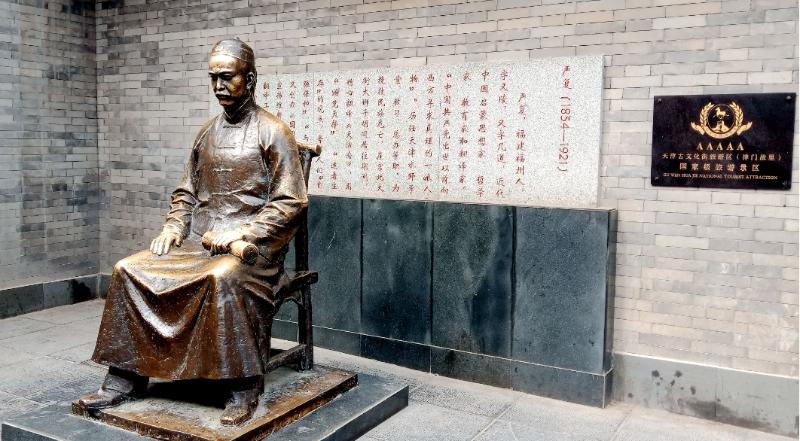Tianjin Ancient Culture Street and Stories of Modern Historical Figures
Tianjin Ancient Culture Street is not only a hub for traditional crafts and local delicacies but also a place rich with historical significance. Numerous modern historical figures have connections to this vibrant street, adding layers of cultural and historical depth to its charm. Here, we delve into the stories of some of these prominent personalities, highlighting their contributions and their connections to Tianjin Ancient Culture Street.
1. Yan Fu's Residence
Yan Fu: A Pioneer of Chinese Modernization
Yan Fu (1854-1921) was a renowned scholar, translator, and reformist thinker in late Qing Dynasty China. He is best known for introducing Western ideas to China, significantly influencing Chinese intellectual history. His translations of Western philosophical and scientific works, including Thomas Huxley's "Evolution and Ethics," played a crucial role in shaping modern Chinese thought.
Yan Fu's Connection to Tianjin
Yan Fu's residence is located near Tianjin Ancient Culture Street, a testament to his lasting influence on the city. The residence is now a part of the cultural heritage of the area, serving as a museum that commemorates his life and work. Visitors can explore the well-preserved house, which offers insights into his intellectual journey and the historical context of his era.
Highlights of the Residence
- Historical Artifacts: The residence houses a collection of Yan Fu's personal belongings, manuscripts, and books.
- Exhibition Rooms: Several rooms are dedicated to showcasing his contributions to Chinese modernization and reform.
- Interactive Displays: Modern exhibits and multimedia presentations provide a comprehensive understanding of Yan Fu's impact.

Reference:Overview of Tianjin Ancient Culture Street
2. Zhang Xueliang's Footprints
Zhang Xueliang: The Young Marshal
Zhang Xueliang (1901-2001), also known as the Young Marshal, was a significant military leader in modern Chinese history. He is famously known for his role in the Xi'an Incident, where he detained Chiang Kai-shek to force a truce between the Nationalist government and the Communist forces, urging them to focus on resisting Japanese invasion.
Zhang Xueliang's Influence in Tianjin
Zhang Xueliang spent considerable time in Tianjin, where he interacted with other political and military leaders. His presence in the city is commemorated through various historical sites and artifacts that highlight his contributions to China's political landscape.
Key Attractions
- Historical Sites: Several locations around Tianjin Ancient Culture Street are associated with Zhang Xueliang, offering a glimpse into his life and times.
- Memorial Exhibits: Museums in the area display artifacts and documents related to Zhang Xueliang's military career and political activities.
3. Liang Qichao's Legacy
Liang Qichao: A Revolutionary Scholar
Liang Qichao (1873-1929) was a prominent scholar, journalist, and reformist during the late Qing Dynasty and early Republic of China. He advocated for modernization and political reform, influencing many young intellectuals of his time.
Liang Qichao's Connection to Tianjin
Liang Qichao lived in Tianjin for many years, where he continued his scholarly work and political activism. His residence, located close to Tianjin Ancient Culture Street, has been preserved as a museum that celebrates his contributions to Chinese literature, education, and reform.
Museum Highlights
- Literary Works: The museum displays Liang Qichao's writings, including his influential essays and books.
- Personal Artifacts: Visitors can view Liang Qichao's personal items, offering a glimpse into his daily life.
- Historical Context: The exhibits provide an in-depth look at the socio-political environment of Liang Qichao's time.
4. The Impact of Historical Figures on Tianjin Ancient Culture Street
Cultural Enrichment
The presence of these historical figures has significantly enriched the cultural fabric of Tianjin Ancient Culture Street. Their residences and memorials attract scholars, history enthusiasts, and tourists, contributing to the street's status as a cultural and historical landmark.
Educational Value
These sites serve as educational resources, providing visitors with insights into China's modern history and the contributions of key figures. Interactive exhibits and well-preserved artifacts offer a tangible connection to the past, fostering a deeper appreciation for the country's heritage.
Preservation Efforts
Efforts to preserve the residences and artifacts of these historical figures underscore the importance of cultural heritage in contemporary society. These preservation initiatives ensure that future generations can continue to learn from and be inspired by the legacies of these influential individuals.
Conclusion
Tianjin Ancient Culture Street is more than just a commercial pedestrian street; it is a living museum of modern Chinese history. The stories of Yan Fu, Zhang Xueliang, Liang Qichao, and other historical figures enrich the cultural landscape, making it a must-visit destination for anyone interested in the rich tapestry of China's past. Through their preserved residences and memorials, visitors can explore the profound impact these figures had on Chinese society and gain a deeper understanding of the historical context that shaped modern China.
Q1: What is the significance of Yan Fu's residence on Tianjin Ancient Culture Street?
A1: Yan Fu's residence on Tianjin Ancient Culture Street is of great historical and cultural significance. Yan Fu was a renowned scholar and translator who introduced many Western ideas to China during the late Qing Dynasty. His translations of Western philosophical and scientific works had a profound impact on modern Chinese thought. The residence serves as a museum that commemorates his life and contributions. Visitors can explore the house, view his personal artifacts, manuscripts, and learn about his role in Chinese modernization and reform through interactive displays.
Q2: How did Zhang Xueliang contribute to China's history, and what can visitors learn about him on Tianjin Ancient Culture Street?
A2: Zhang Xueliang, also known as the Young Marshal, played a crucial role in modern Chinese history, particularly through his involvement in the Xi'an Incident. By detaining Chiang Kai-shek, he forced the Nationalist government to focus on resisting the Japanese invasion rather than fighting the Communists. On Tianjin Ancient Culture Street, visitors can learn about Zhang Xueliang's military and political career through various historical sites and memorial exhibits. These locations display artifacts, documents, and provide insights into his significant contributions to China's political landscape.